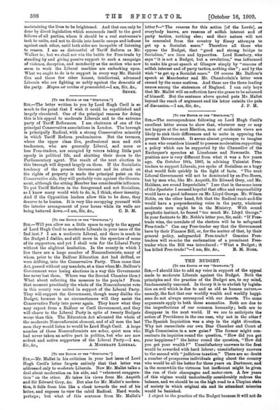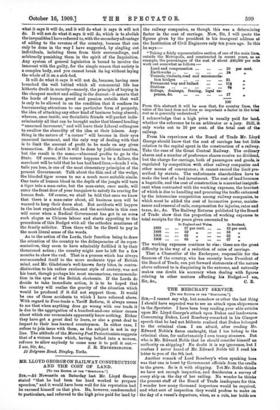THE BUDGET.
[TO THE EDITOR OF THE "SPECTATOR.")
SIR, I should like to add my voice in support of the appeal made to moderate Liberals against the Budget. Both the principles and the practice of the Budget are, to my mind, fundamentally unsound. In theory it is to abolish by legisla- tion an evil which is due to and as old as human nature,-- namely, the fact that our worldly wealth and worldly happi- ness do not always correspond with our deserts. The same arguments apply to both these anomalies. Both are due to the imperfections of our common humanity ; both are to disappear in the next world. If we are to anticipate the action of Providence in the one case, why not in the other P The Spanish Inquisition was a step in the right direction. Why not resuscitate our own Star Chamber and Court of High Commission in a new guise P The former might con- centrate its inquiries round the question, " How did you get your happiness P" the latter round the question, "How did you get your wealth ?" Unsatisfactory answers to the first would be rewarded with hard labour ; unsatisfactory answers to the second with " judicious taxation." There are no doubt a number of prosperous individuals going about the country who would be all the better for three years on Dartmoor, and in the meanwhile the virtuous but inefficient might be given the run of their champagne and motor-cars. A few years of this regime would undoubtedly considerably redress the balance, and we should be on the high road to a Utopian state of society in which original ain and its attendant miseries would be banished.
I object to the practice of the Budget because it will not do what it says it will do, and it will do what it says it will not do. It will not do what it says it will do, which is to abolish the inequalities I have referred to, with the secondary advantage of adding to the revenue of the country, because that can only be done in the way I have suggested, by singling out individuals, isolating them from their surroundings, and arbitrarily punishing them in the spirit of the Inquisition. Any system of general legislation is bound to involve the innocent with the guilty, for the simple reason that society is a complex body, and you cannot break its leg without laying the whole of it on a sick-bed.
It will do what it says it will not do, because, having once breached the wall behind which all commercial life has hitherto dwelt in security—namely, the principle of buying in the cheapest market and selling in the dearest—it asserts that the horde of human greed and passion outside that wall is only to be allowed in on the condition that it confines its buccaneering attentions to one particular form of property, the idea of attacking any other kind of bnsiness being absurd; whereas, once inside, our Socialistic friends will pocket indis- criminately all that can be brought under that blessed heading "unearned increment," and will leave their Liberal colleagues to swallow the absurdity of the idea at their leisure. Any- thing in the nature of "a corner" will become in their eyes unearned increment, and the only way of dealing with that is to limit the amount of profit to be made on any given transaction. No doubt it will be done by judicious taxation, but the result is the same,—abnormal profits to go to the State. Of course, if the corner happens to be a failure, the merchant will be told that he has had hard lines,—heads I win, tails you lose, is one of the most elementary principles of the present Government. Talk about the thin end of the wedge, the blooded tiger seems to me a much more suitable simile. One taste of human blood in the depth of the jungle will turn a tiger into a man-eater, but the man-eater, once made, will enter the front door of your bungalow to satisfy its craving for human flesh. Of course, we shall be told that once we know that there is a man-eater about, all business men will be warned to keep their doors shut. But accidents will happen in the best regulated families, and the accidents in this case will occur when a Radical Government has got in on some such slogan as Chinese labour and starts appealing to the precedents of this Budget with all the orthodox mustiness of the family solicitor. Then there will be the Devil to pay in the most literal sense of the words.
As to the action of the Lords, their function being to draw the attention of the country to the delinquencies of its repre- sentatives, they seem to have admirably fulfilled it by their threatened action ; the country might now be left for a few months to chew the cud. That is a process which has always recommended itself to the more moderate type of British mind, and Mr. Gladstone's well-known forty bites, in contra- distinction to his rather exuberant style of oratory, was not his least, though perhaps his most unconscious, recommenda- tion in the eyes of the British electorate. If the Lords do decide to take immediate action, it is to be hoped that the country will realise the gravity of the situation which would be produced if it did not support them. It would be one of those accidents to which I have referred above. With regard to Free-trade v. Tariff Reform, it always seems to me that when anything does go wrong with our trade it is due to the aggregation of a hundred-and-one minor causes about which our economists apparently know nothing. Either they have got a great deal to learn, or else a great deal to impart to their less learned countrymen. In either case, I refuse to join issue with them, as the subject is not in my line. The attitude of the Morning Post Protectionists suggests that of a vicious horse which, having bolted into a morass, refuses to allow anybody to come near it to pull it out.— I am, Sir, &c., J. R. HETHERINGTON. 10 Belgrave Boad, Bingley, Yorks.















































 Previous page
Previous page